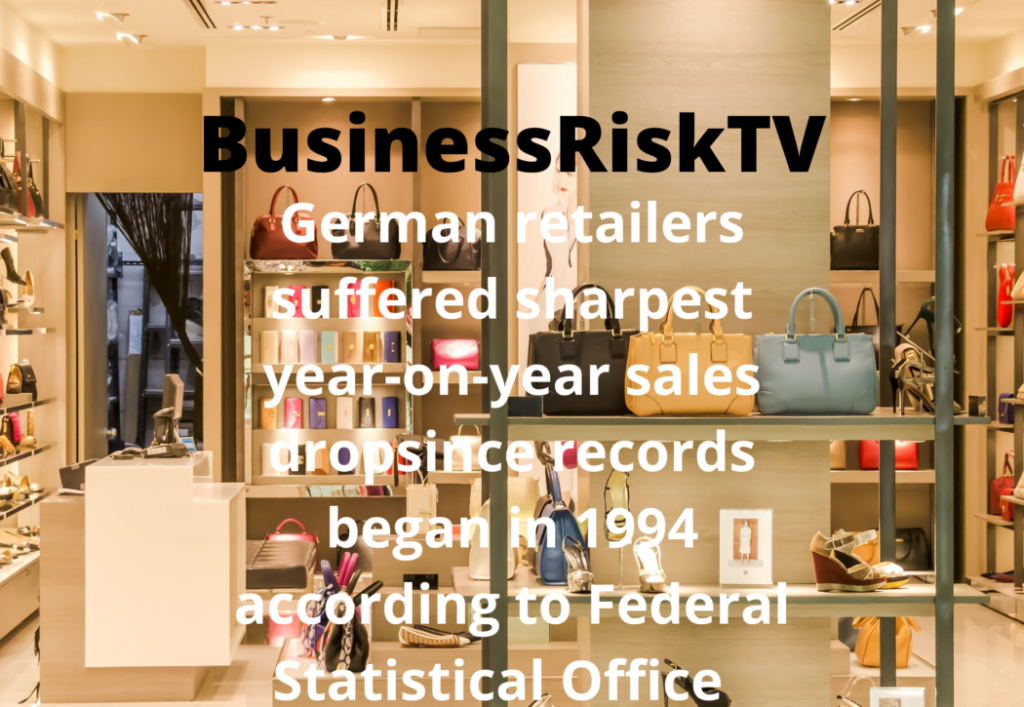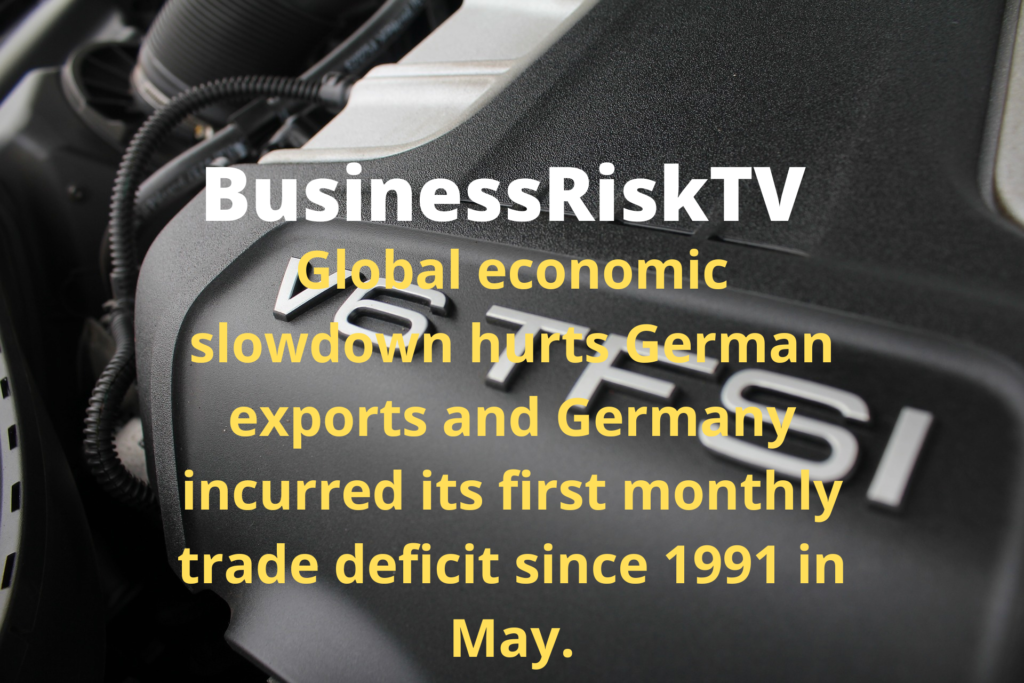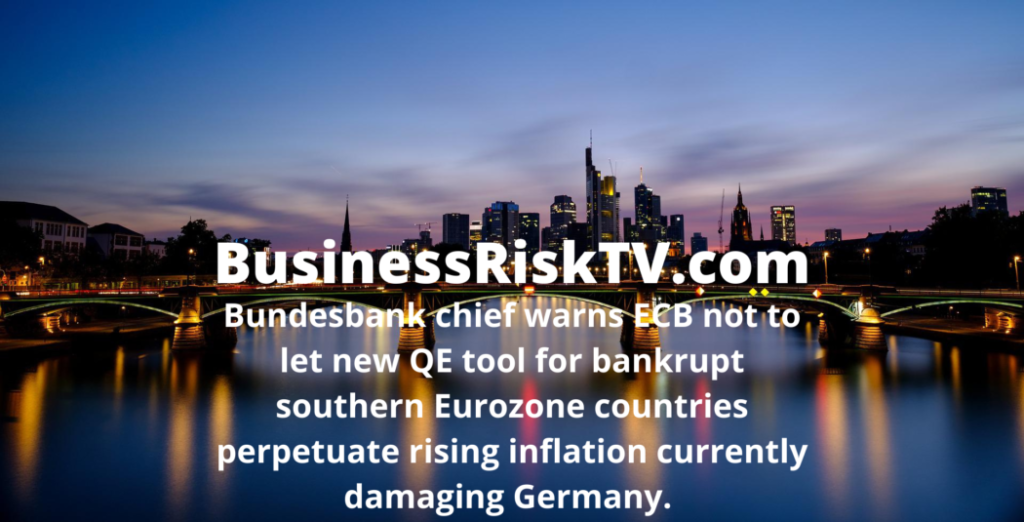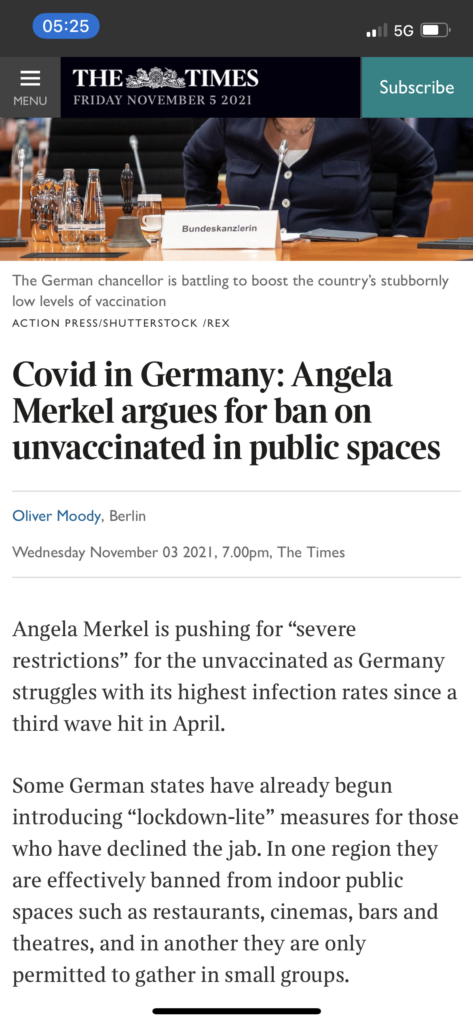Do you want Germany expert business and economy news, risk analysis, risk insight, risk management advice and tips on the biggest risks on the horizon or affecting your business right now.
Want all the latest Germany business risk management news and Germany enterprise risk analysis? Sign up to our BusinessRiskTV Germany newsletter, Germany Business Risk Alerts and Germany Business and Economic Risk Reports email editor@businessrisktv.com or follow us on your favourite social media account.
Subscribe for free to Germany Business Magazine news opinions and reviews risk alerts and newsletter.
Germany news on business risks. Germany business directory. Do more business in Germany. Read and watch the latest Germany business and economy articles news and features. Discover the best and worst of Germany to manage threats and opportunities. Save money and time solving business problems. Find the best deals discounts and special offers. Connect with top business leaders for Germany. Discover innovative ways to achieve more in Germany.
Germany Business News Lifestyle In Germany Travel Tips For Germany
30 January 2024 -The head of Germany’s financial market regulator said that 2024 will be less rosy for bank profits and that commercial property was the biggest risk, in stepped-up warnings as Europe’s largest economy undergoes its biggest real estate crisis in decades.
30 June 2023 – Bundesbank May Need Bailout by Taxpayers After £570 Billion Loss from Bond-Buying
The Bundesbank, Germany’s central bank, may need a bailout by taxpayers to cover losses on the debt it hoovered up as part of the European Central Bank’s (ECB) massive bond-buying programme.
A report by Germany’s federal auditor, the Bundesrechnungshof, has warned that the Bundesbank could face losses of up to €650 billion (£570 billion) on its bond holdings. This is due to the fact that the ECB’s bond-buying programme has pushed down interest rates, making it more expensive for the Bundesbank to roll over its debt.
The Bundesrechnungshof said that the losses faced by the Bundesbank were “substantial” and “could necessitate a recapitalisation with budgetary funds”. This means that the German government could be forced to inject money into the Bundesbank to help it cover its losses.
The report has thrown into doubt the future of the ECB’s bond-buying programme. The programme has been credited with helping to prevent the eurozone from collapsing during the financial crisis, but it has also been criticized for creating asset bubbles and distorting market forces.
The Bundesbank has defended its participation in the ECB’s bond-buying programme, saying that it was necessary to prevent the collapse of the eurozone. However, the report by the Bundesrechnungshof has raised questions about whether the programme was worth the risk.
The report has also sparked a political debate in Germany. The opposition Social Democrats have called for the Bundesbank to be fully recapitalised by the government, while the governing Christian Democrats have said that they will wait for more information before making a decision.
The outcome of the debate is uncertain, but it is clear that the Bundesbank is facing a major financial challenge. If the bank does need a bailout, it will be a significant blow to the credibility of the ECB and the eurozone.
Impact on the German economy
A bailout of the Bundesbank would have a significant impact on the German economy. The bank is a major lender to German businesses and households, and a loss of confidence in the bank could lead to a credit crunch. This could in turn lead to a recession in Germany, which would have a negative impact on the rest of the eurozone.
The bailout would also be a major financial burden for the German government. The government would have to raise taxes or cut spending in order to finance the bailout, which would reduce economic growth.
Impact on the ECB
A bailout of the Bundesbank would also be a major blow to the ECB. The bank has been criticised for its role in the eurozone crisis, and a bailout of the Bundesbank would only add to these criticisms.
The bailout would also raise questions about the future of the ECB’s bond-buying programme. The programme has been credited with preventing the collapse of the eurozone, but it has also been criticised for creating asset bubbles and distorting market forces.
A bailout of the Bundesbank could lead to calls for the ECB to end its bond-buying programme. This would be a major setback for the ECB, and it would make it more difficult for the bank to prevent the collapse of the eurozone.
The Bundesbank is facing a major financial challenge. If the bank does need a bailout, it will be a significant blow to the credibility of the ECB and the eurozone. The bailout would also have a negative impact on the German economy and could lead to a recession.
The outcome of the debate over the bailout is uncertain, but it is clear that the Bundesbank is facing a critical juncture. The decision of whether or not to bailout the bank will have a major impact on the future of the eurozone.

More articles:
Is Bundesbank independent?
3 October 2022 – German manufacturing activity contracted for third month in a row in September 2022 due to soaring cost of energy.
The soaring cost of energy in Germany and around the world has forced German manufacturers to cut production and the winter hasn’t even started yet. Add in the closure of the Nord Stream 1 pipeline for the winter at least and you have a very bleak vision for Germany and the rest of Europe.
Nord Stream 1 gas pipeline stopped sending any gas to Germany on 31 August 2022, shutdown for repairs. Gazprom says it was unable to reopen the pipeline due to sanctions imposed on Russia. Last week things went from bad to worse when both Nord Stream 1 and 2 pipelines were prevented from sending gas by sabotage attacks that will stop gas being sent to Germany for at least this winter. This means higher costs for not just German manufacturers but will shrink demand domestically and internationally as prices of products and services are forced up due to rising inflation.
4 September 2022 – Germany has announced a €65 billion package of measures to ease the threat of rising energy costs
A windfall tax on energy company profits would also be used to mitigate the cost to ordinary German taxpayers. However, Germany will also impose a gas levy on consumers from 1st October 2022 through to March 2024 as part of measures to ensure utility companies remain liquid enough to maintain an intact gas market.
The German government has warned that utilities risk a similar collapse to that of Lehman Brothers 2008 heralding the financial sector driven financial collapse, due to soaring energy prices.
German Economy Minister Robert Habeck, at end of August, had expected gas prices to fall soon as Germany is making progress on its storage targets and won’t have to pay the high asking prices currently commanding the market. He will need to recalibrate his energy price risk assessment now!
The German economy is already in recession and this is likely to be a protracted one, perhaps even an economic depression. In addition, German inflation is accelerating towards double pages whilst the ECB is set to increase interest rates by at least half a percent, perhaps 3/4 of a percent.
14 August 2022 – German gas storage facilities were slightly more than 75% full last Friday, a couple of weeks ahead of target, data from European operators group GIE showed on Sunday.
The government had targeted gas storage levels to reach 75% by 1st September. The next targets are 85% by 1st October and 95% by 1st November, which are embedded in a number of provisions aimed at helping Germany to avoid a gas crisis in the 2022/23 winter.
The provisions include higher imports of liquefied natural gas (LNG) and incentives to reduce energy usage.
11 August 2022 – Does Germany have human rights violations?

German Health Minister Karl Lauterbach has announced that the nation’s digital contact tracing and vaccine passport app, Corona-Warn-App (CWA), will start assigning different colors to citizens based on whether they received a COVID-19 vaccine within the last three months.
The CWA will assign one color to citizens who add proof that they received a vaccine within the last three months and a different color to citizens who add proof of vaccination that’s more than three months old. Only those with the color showing that they’re “freshly vaccinated” (have received a vaccine within the last three months) will be exempt from Germany’s mask requirement in public indoor spaces.
Those with a green code are allowed to move freely, those with a yellow code may be asked to stay home for seven days, and those with a red code have to quarantine for two weeks.
BusinessRiskTV
Other citizens, including those who received multiple vaccines but had their last vaccine more than three months ago, will have to show proof of recent recovery from COVID or a current negative test to get an exemption from this mask requirement. However, “the goalposts could shift at any time”, means what?
Health agencies defended the rollout of vaccine passports and other COVID surveillance measures by claiming that they would prevent the spread of the coronavirus. However, in recent weeks, government health experts have admitted that COVID vaccines don’t prevent infection or prevent spread of infection..
Despite this admission, Germany and other nations are continuing to push far-reaching, restrictive vaccine passport systems. Some countries are also combining vaccine passports with digital ID or rolling out more invasive COVID surveillance devices such as wristbands and ankle bracelets. Fortunately, the other countries are not going to use stars to identify the unvaccinated or those who have been vaccinated multiple times, but are not freshly vaccinated!
3 August 2022 – The German government may have to amend its energy security law again in September as its gas levy may not be able to be imposed on all consumers.
A gas levy, which had been set to come into force from October, was envisaged as a tool to collect funds from all gas consumers in Germany to support struggling gas importers trying to stop the lights of industry going out in the winter.
Many German gas consumer contracts have clauses guaranteeing fixed prices which may make adding on a levy impossible. If say a quarter of consumers cannot be forced to pay levy, then the rest would have to pay bigger levy.
1 August 2022 – German retailers suffer worst start to a year on record

25 Jul 2022 – Economic powerhouse of Europe deflated
Ifo business sentiment survey showed expectations for business to significantly worsen in the coming months.
German government has said it would prioritise residents over the corporate sector in the event of rationing of gas this winter.
BusinessRiskTV
The German economy is heading for a recession according to the expectations of business leaders in Germany. S&P Global’s flash Purchasing Managers’ Index (PM) for German services and its index for manufacturing both fell to 49.2 in July, data showed last Friday. A figure below 50 mark indicates business activity contraction instead of business growth.
5 July 2022 – Global economic slowdown hurts German exports and Germany incurred its first monthly trade deficit since 1991 in May.

4 July 2022 – Bundesbank bank on quantitative tightening and inflation risk
Bundesbank chief Joachim Nagel warned the European Central Bank ECB against trying to push down borrowing costs for southern Eurozone countries as the ECBs focus should be on smothering inflation not allowing southern countries of Eurozone to perpetuate stoking of inflation with cheap sovereign money supplied by ECB. The Bundesbank wants more aggressive ECB quantitative tightening not maintenance of mandatory stimulus via reformed ECB QE tool.
The ECB last month pledged to buy more bonds from debt-laden countries like Italy and Spain to contain a widening spread between their borrowing costs and Germany’s.
Southern Eurozone country monetary stimulus should only be supplied in exceptional circumstances with narrowly defined conditions and duration so the ECB avoids signalling that it will always supply unwarranted cheap money to southern rim of Eurozone.

7 June 2022 – German manufacturing orders dropped in April unexpectedly.
Financial market watchers expected orders to have risen. Manufacturing orders fell 2.7 percent on month in adjusted terms, according to data from the German Economics Ministry. Manufacturing orders fell 6.2 percent in April on an annual basis, the German Economics Ministry said today.
12 May 2022 – Germany’s annual rate of inflation rose in April to its highest level since Autumn s1981, according to the final data released by German statistics office Destatis..
Consumer prices rose 7.4 percent year-on-year as measured by German national standards. They rose 7.8 percent by European Union harmonised standards.
6 May 2022 – German industrial production fell more than expected in March.
The Federal Statistics Office said industrial output fell 3.9 percent on the month after a downwardly revised increase of 0.1 percent in February.
The last time there was a sharper decline was at the beginning of the coronavirus crisis in April 2020.
30 March 2022 – Germany national consumer price index (CPI) rose 7.3% year on year in March which jumped from 5.1% in February.
Germany’s inflation rate much more than many thought it would in March.
2 December 2021 – Germany to partner Austria in Locking Down The Unvaccinated In A Repeat Of History
People who haven’t been vaccinated in Germany are going to be banned from going into non essential shops, bars and leisure events as part of new Covid lockdown rules. When in the last century have we seen something similar in Austria and Germany.
Even worse, against the Nuremberg Code, Germany leaders are to vote on forced vaccination of its citizens of experimental drugs. Germany seems to want to follow Austria in bringing in mandatory vaccination in February 2022.
The President of the European Commission EC Ursula Von der Leyen also said in public that all European Union EU countries should bring in mandatory vaccinations.

Subscribe to BusinessRiskTV for free online Germany marketplace magazine alerts bulletins and reviews
Enter code #GermanyOnline
Promote and market your business in Germany on BusinessRiskTV for 12 months

Put your products and services in front of new people already interested in your type of business offering before your competitors do.
Link into your existing online sales process direct from BusinessRiskTV or use our eCommerce solutions to increase your sales cash flow and profit.
Increase the sources of your revenue streams more sustainably. Grow your business in Germany and globally with BusinessRiskTV.
Latest Germany business and economy news opinions debate and reviews

Has Germany ever before isolated a portion of its own citizens and citizens of other countries? The worrying advocacy of the German Chancellor is not justified by rising COVID-19 infection rates in Germany especially as vaccinated people still catch the virus and can still spread the virus to vaccinated and unvaccinated people. The world should think very carefully about freedoms fought for and hard earned human rights before it slides further down the slippery slope to totalitarianism and fascism. A glance at the Nuremberg Code maybe some good homework for people in Germany and around the world when implementing a pandemic risk management action plan.


Become a subscriber to BusinessRiskTV Germany Online. What are the risks of doing more business in Germany? How can you overcome the barriers to more trade with Germany? How can you export more from Germany and import more into Germany?
German Economy Bounced Back 3rd Quarter 2020 By More Than Previously Reported
The 3rd quarter was when pandemic restrictions were all lifted and Germany was back to almost normal business.
German gross domestic product GDP grew at a record rate of 8.5% compared with the second quarter according to revised figures from the Federal Statistics Office.
BusinessRiskTV
The Statistics Office revised its third-quarter GDP estimate up to 8.5%, from the previous flash estimate of 8.2%.
A pandemic second wave of the virus affecting most of Europe has caused COVID-19 infections to surge to record daily highs in Germany in the past couple of months. Germany has been put in partial-lockdown for November which is likely to be extended to 20th December 2020. The second German lockdown is likely to cause double-dip contraction of the economy in the final quarter of the year inevitable. The strong recovery of manufacturinng in Germany may save Germany from a second contraction of the German economy.
20th August 2020 Germany Considers Wider Use Of Universal Basic Income UBI
If people do not have a job they create a burden on society that has to be solved one way or another. If they have a basic income level most people spend close to the full amount and thereby increase business income and help grow the economy. In addition they can contribute in other ways to the benefit of society if they do not have to work every day including looking after elderly parents. However it costs a lot of money to give people without a job a sizable amount every month without any measurable output. Now they are going to measure the unmeasurable of UBI.
Being giving more people more money if they are not working the German government wants to know the costs and benefits. German researchers are to give a group of people just over a thousand pounds every month unconditionally for three years in a study to evaluate whether to introduce UBI and if so advise at what level the UBI should be to work for everyone in Germany.
19th August 2020 German Public Health Regulator Thinks COVID-19 Vaccinations Could Start Early 2021

The head of the Paul Ehrlich Institute told Funk Media Group the first coronavirus vaccinations for certain groups of people could start as soon as the beginning of 2021. First and second phase vaccine trials showed that some of the vaccines tested triggered an immune response against the virus.
Increasing Evidence Germany Will Recover Very Quickly From Economic Impact Of Coronavirus
Industrial orders and domestic consumer purchases are recovering quickly and accelerating month by month. Is this sustainable? Well Germany was struggling to stay out of recession before the pandemic hit. Dieselgate scandal was not helping the economy perform stronger. Germany is putting the diesel engine scandal behind it now people are focused on pandemic recovery.
If China continues to recover then Germany will also. A trade dispute between Eurozone and USA could become a problem. If Germany forces the rest of EU to settle Brexit amicably then Germany can see a rapid sustainable economic recovery.

Mercedes Benz Demand Indicates Automotive Industry Recovering From Cornavirus Pandemic
In addition there are growing signs that German consumer confidence in quick economic recovery from pandemic is on the cards.

Want to have your say on Germany lifestyle or business?

Become a Germany Citizen Journalist. Reach more people interested in your views on life and business in Germany with BusinessRiskTV.
Encourage more trade with Germany by exhibiting your products and services on BusinessRiskTV. Are you a business owner or manager in Germany? Want to sell more in Germany? Export more from Germany? Use our innovative websites social media and free apps to grow your business faster more profitably more sustainably.

Virtual Online Germany Conference and Exhibition
Showcase your business in Germany and globally in our online trade fairs and exhibitions for Germany. Use our trade show for your business in Germany. BusinessRiskTV trade fairs and exhibitions will prove to be more profitable for your business.
- Want to list your business in our online Germany business directory?
- Are you running deals discounts or special offers in Germany online you want more people to know about?
- Could you write an advertorial to advertise your business in Germany and inform our readers?
Reach more new customers in Germany online and globally with BusinessRiskTV.

Demonstrate why new customers should buy your product or service instead of your competitors products or services. When additional sales are made in our Germany online trade fair and exhibition it will feed into your normal sales process or use our online ecommerce facility linked to your own account so you stay in control of the money received for increased online sales.
Germany Jobs and Careers
Our Germany recruitment fair.
- Find a job in Germany.
- Fill your job vacancy in Germany faster and cheaper.
- Support your own recruitment processes
Drive your business forward in Germany. Boost your career in Germany.
Post your job vacancy in Germany online with BusinessRiskTV CLICK HERE entering code #GermanyJobs.
BusinessRiskTV Germany Business Risks
What’s happening in Germany? What should be happening in Germany to increase business growth? What needs to be done to protect businesses in Germany and trade with Germany?
BusinessRiskTV Germany TV Live and Ondemand
German Business Culture
German Business Culture Analysis and Review with BusinessRiskTV
German Business Culture Overview
Germany is one of the most important economic powers in the world, with a highly developed economy and a rich cultural heritage. German business culture has long been renowned for its efficiency, precision, and dedication to quality, and German companies are respected worldwide for their technical expertise, engineering skills, and innovative products.
If you’re thinking of doing business in Germany, understanding German business culture is essential. This article will provide an overview of the key aspects of German business culture, including communication styles, work ethics, and business etiquette.
Communication Styles
In Germany, communication is often direct and to the point. Germans value clear and concise language, and they tend to avoid ambiguity and small talk. They are also not afraid to give negative feedback or criticism, and they expect others to be similarly direct with them. This can sometimes be seen as blunt or rude by those who are not accustomed to this style of communication.
When communicating with Germans, it is important to be prepared and organised. Germans appreciate punctuality and preparedness, and they expect others to be on time and well-prepared for meetings and discussions. It is also important to be clear and concise in your communication, as Germans value clarity and directness.
Work Ethics
Germans are known for their strong work ethic and dedication to their jobs. They value punctuality, reliability, and hard work, and they take great pride in their work. Germans tend to be highly organized and efficient, and they place a great deal of importance on planning and preparation.
In the German business world, hierarchy and structure are important. Companies tend to have clear lines of authority and decision-making, and employees are expected to follow established protocols and procedures. Germans also value teamwork and collaboration, and they expect everyone to work together towards common goals.
Business Etiquette
In Germany, business etiquette is important, and there are certain customs and protocols that should be followed. When meeting someone for the first time, it is customary to shake hands and make direct eye contact. It is also important to address people by their formal titles and last names, and to use the appropriate titles for professional and academic qualifications.
When attending business meetings, it is important to be well-prepared and organised. Germans value punctuality, and it is considered rude to arrive late. It is also important to be respectful and courteous towards others, and to listen carefully to what they have to say.
When it comes to dress codes, Germans tend to dress conservatively and professionally. Suits and ties are the norm for men, while women typically wear formal business attire. It is important to dress appropriately for the occasion, and to avoid anything too casual or informal.
Networking is also important in the German business world, and there are many opportunities for business professionals to meet and connect with others. However, it is important to be respectful of others’ time and schedules, and to avoid being too pushy or aggressive when trying to make contacts or connections.
Challenges of Doing Business in Germany
While German business culture has many strengths, there are also some challenges that foreign companies may face when doing business in Germany. One of the biggest challenges is the language barrier. While many Germans speak English, it is important to have at least some knowledge of German in order to communicate effectively with clients and customers.
Another challenge is the regulatory environment. Germany has strict regulations and rules when it comes to business practices and standards, and it can be difficult for foreign companies to navigate the complex legal landscape. It is important to have a good understanding of the regulations and requirements in order to avoid any legal issues or complications.
Finally, competition can be fierce in the German market. German companies are known for their technical expertise and innovation, and they are often well-established and well-respected within their industries. This can make it challenging for foreign companies to break into the market and establish a foothold. However, with careful planning and preparation, it is possible to succeed in the German market.
Tips for Doing Business in Germany
If you’re planning to do business in Germany, here are some tips to help you navigate the cultural and business landscape:
Learn the language. While many Germans speak English, it is important to have at least some knowledge of German in order to communicate effectively with clients and customers. Learning the language also shows that you are committed to doing business in Germany and respect their culture.
Build relationships. Networking is important in the German business world, and building relationships is key to success. Take the time to get to know your clients and customers, and show a genuine interest in their culture and customs.
Be prepared and organised. Germans value punctuality and preparedness, so make sure you are well-prepared for meetings and discussions. Have all the necessary information and documents ready, and be clear and concise in your communication.
Be respectful of hierarchy and structure. German companies tend to have clear lines of authority and decision-making, so it is important to be respectful of hierarchy and follow established protocols and procedures.
Emphasise quality and reliability. Germans value quality and reliability in their products and services, so it is important to emphasize these qualities in your business dealings.
German business culture is known for its efficiency, precision, and dedication to quality. While there are challenges to doing business in Germany, with careful planning and preparation, it is possible to succeed in the German market. By understanding and respecting German business culture, building relationships, and emphasising quality and reliability, foreign companies can establish a foothold in this important economic power.
#BusinessRiskTV #Germany #GermanyOnline #GermanyEconomy #GermanyBusiness #GermanyMarketplace #GermanyReview #GermanyJournalist #GermanyDirectory #GermanyJobs #GermanyMagazine #GermanyNews #GermanyReports #GermanyToday #GermanyExhibitions #CoronavirusGermany #COVID19germany
Discover better ways to protect and grow your business with BusinessRiskTV
Germany Business Magazine BusinessRiskTV Business Risks Germany

BusinessRiskTV Business Risk Management Club